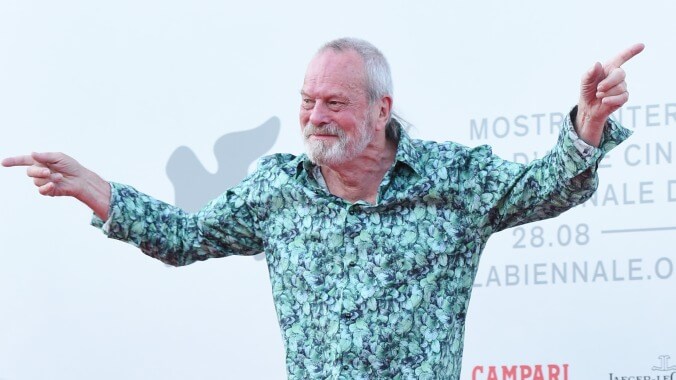Whatever curse has blocked the majority of Terry Gilliam’s film-making efforts over the last few decades has once again cruelly failed to apply itself to his ability to give interviews, as The Independent ran a conversation with the Brazil filmmaker today that he presumably thought came off as clever and impish, and which reads to pretty much everybody else as, well, this:
I’m tired, as a white male, of being blamed for everything that is wrong with the world…I don’t like the term black or white. I’m now referring to myself as a melanin-light male. I can’t stand the simplistic, tribalistic behaviour that we’re going through at the moment.
To the credit of interviewer Alexandra Pollard, she does try like hell to get Gilliam to speak on the topic of, say, his latest movie, the legendarily delayed The Man Who Killed Don Quixote. But Gilliam appears to have developed a whole new set of windmills to go tilting at, doubling down on assertions he made in recent years that the #MeToo movement is a “witch hunt”—“I really feel there were a lot of people, decent people, or mildly irritating people, who were getting hammered”—and his insistence that he considers himself a “black lesbian in transition,” which he first trotted out back in 2018 with an energy that really causes the lines between “puckish” and “prickish” to blur.
The most telling part of the interview comes when Gilliam attempts to tie his current gadfly attitude back to his old Monty Python days, claiming that it’s just another version of trying to tell truth to power. (“I’m just trying to make you start thinking,” he notes, issuing the classic mantra of the “Can’t get mad at me for askin’ questions!” type) But as Pollard—who spends much of the interview trying to break through Gilliam’s glib exterior, only to find fresh new layers of glibness underneath—notes, the Python material (at its best, anyway) was fundamentally aimed at skewering harmful social institutions, not people seeking justice for, say, industry-wide practices that victimized women. (Does Terry Gilliam have a story about an “ambitious” woman sexually propositioning him to be in one of his movies? Why, of course he does!)
In the end, Gilliam comes off practically gleeful at the idea that he managed to dodge pretty much all questions about his actual movie, in favor of delivering a new load of goodwill-eroding soundbites that we’re going to have to try really hard not to think about the next time Time Bandits comes on. “I’m getting myself in deeper water, so I have to trust you,” he tells Pollard at one point; she expresses complete confusion at what he’s supposedly trusting her with, beyond the not-exactly-a-secret that meeting your heroes is almost never a good idea.

